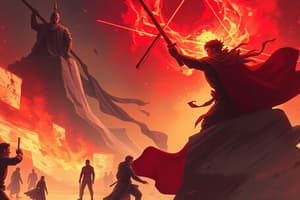Podcast
Questions and Answers
What is the definition of politics?
What is the definition of politics?
- A voluntary process of give-and-take to reach a mutually beneficial agreement
- A struggle over resources or benefits
- The process of making decisions that allocate resources and distribute benefits and burdens among members of a group or society (correct)
- The ability to influence the behavior of others, often by controlling resources, information, or social relationships
What is coercive power?
What is coercive power?
- The ability to influence based on knowledge or expertise
- The ability to offer benefits or rewards to achieve compliance
- The ability to force others to comply through punishment or reward (correct)
- The ability to influence based on a perceived right to lead or authority
What is a power conflict?
What is a power conflict?
- A voluntary process of give-and-take to reach a mutually beneficial agreement
- A struggle over values, goals, or interests
- A disagreement or incompatibility between individuals or groups with different values, goals, or interests (correct)
- A struggle over resources or benefits
What is distributive conflict?
What is distributive conflict?
What is the pluralist theory of power?
What is the pluralist theory of power?
What is negotiation?
What is negotiation?
What is referent power?
What is referent power?
What is arbitration?
What is arbitration?
Flashcards are hidden until you start studying
Study Notes
Definition of Politics and Power
- Politics: the process of making decisions that allocate resources and distribute benefits and burdens among members of a group or society
- Power: the ability to influence the behavior of others, often by controlling resources, information, or social relationships
Types of Power
- Coercive power: the ability to force others to comply through punishment or reward
- Reward power: the ability to offer benefits or rewards to achieve compliance
- Legitimate power: the ability to influence based on a perceived right to lead or authority
- Expert power: the ability to influence based on knowledge or expertise
- Referent power: the ability to influence based on relationships or charisma
Conflict and Politics
- Conflict: a disagreement or incompatibility between individuals or groups with different values, goals, or interests
- Power conflict: a struggle for control or influence between individuals or groups with differing goals or interests
- Types of conflict:
- Distributive conflict: a struggle over resources or benefits
- Integrative conflict: a struggle over values, goals, or interests
- Cultural conflict: a struggle between different cultural values or practices
Theories of Power and Politics
- Pluralist theory: power is dispersed among many groups and individuals
- Elite theory: power is concentrated among a small group of elite individuals
- Marxist theory: power is held by those who control the means of production
- Feminist theory: power is gendered, with men historically holding more power than women
Strategies for Managing Power Conflicts
- Negotiation: a voluntary process of give-and-take to reach a mutually beneficial agreement
- Mediation: a facilitated negotiation process with a neutral third-party mediator
- Arbitration: a binding decision made by a neutral third-party arbitrator
- Coercion: the use of force or threat to impose one's will on others
Definition of Politics and Power
- Politics is the process of making decisions that allocate resources and distribute benefits and burdens among members of a group or society
- Power is the ability to influence the behavior of others, often by controlling resources, information, or social relationships
Types of Power
- Coercive power allows forcing others to comply through punishment or reward
- Reward power involves offering benefits or rewards to achieve compliance
- Legitimate power influences based on a perceived right to lead or authority
- Expert power influences based on knowledge or expertise
- Referent power influences based on relationships or charisma
Conflict and Politics
- Conflict occurs when individuals or groups have different values, goals, or interests
- Power conflict is a struggle for control or influence between individuals or groups with differing goals or interests
- Distributive conflict involves a struggle over resources or benefits
- Integrative conflict involves a struggle over values, goals, or interests
- Cultural conflict involves a struggle between different cultural values or practices
Theories of Power and Politics
- Pluralist theory: power is dispersed among many groups and individuals
- Elite theory: power is concentrated among a small group of elite individuals
- Marxist theory: power is held by those who control the means of production
- Feminist theory: power is gendered, with men historically holding more power than women
Strategies for Managing Power Conflicts
- Negotiation involves a voluntary process of give-and-take to reach a mutually beneficial agreement
- Mediation involves a facilitated negotiation process with a neutral third-party mediator
- Arbitration involves a binding decision made by a neutral third-party arbitrator
- Coercion involves the use of force or threat to impose one's will on others
Studying That Suits You
Use AI to generate personalized quizzes and flashcards to suit your learning preferences.




